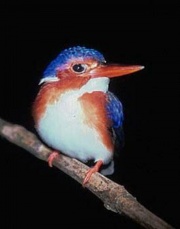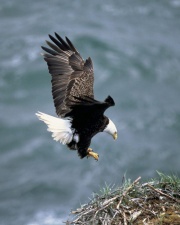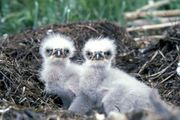Difference between revisions of "Bird"
| Line 2: | Line 2: | ||
== Description == | == Description == | ||
[[File:Eagle_flight_USFW.jpg|thumb|Bald Eagle ''Haliaeetus leucocephalus'']] | [[File:Eagle_flight_USFW.jpg|thumb|Bald Eagle ''Haliaeetus leucocephalus'']] | ||
| − | A warm-blooded, bipedal, egg-laying vertebrates of the class Aves. Birds are found worldwide and normally have toothless beaks, feathers, winged-forelimbs, and hollow bones. They range in size from the tiny [[hummingbird|hummingbirds]] to the large [[ostrich]]. Some birds, such as poultry ([[chicken]], [[duck%20%28bird%29|ducks]], [[turkey]], etc.) have been domesticated and are raised for their [[egg|eggs]] and meat. [[Feather|Feathers]] from several types of bird have been used for decoration, writing instruments ([[quill]]) and for filling mattresses and pillows ([[down]]). Some birds, such as [[pigeon|pigeons]], [[starling|starlings]], and [[sparrow|sparrows]], are considered pests because they congregate in populated areas producing debris and deleterious droppings ([[guano]]). Numerous [[deterrent]] methods such as nets, spikes, wires, gels, plastic owls, electric shocks, along with many types of mechanical and ultrasonic devices are being used with moderate success. See also [[condor]], [[owl]], [[hawk]], [[eagle]], [[heron]], [[flamingo]], [[kingfisher]], [[peacock]], [[crow]], and | + | A warm-blooded, bipedal, egg-laying vertebrates of the class Aves. Birds are found worldwide and normally have toothless beaks, feathers, winged-forelimbs, and hollow bones. They range in size from the tiny [[hummingbird|hummingbirds]] to the large [[ostrich]]. Some birds, such as poultry ([[chicken]], [[duck%20%28bird%29|ducks]], [[turkey]], etc.) have been domesticated and are raised for their [[egg|eggs]] and meat. [[Feather|Feathers]] from several types of bird have been used for decoration, writing instruments ([[quill]]) and for filling mattresses and pillows ([[down]]). Some birds, such as [[pigeon|pigeons]], [[starling|starlings]], and [[sparrow|sparrows]], are considered pests because they congregate in populated areas producing debris and deleterious droppings ([[guano]]). Numerous [[deterrent]] methods such as nets, spikes, wires, gels, plastic owls, electric shocks, along with many types of mechanical and ultrasonic devices are being used with moderate success. See also [[condor]], [[owl]], [[hawk]], [[eagle]], [[heron]], [[flamingo]], [[kingfisher]], [[peacock]], [[crow]], and sea gull. |
[[File:Bald eagle chicks.jpg|thumb|Bald Eagle chicks ''Haliaeetus leucocephalus'']] | [[File:Bald eagle chicks.jpg|thumb|Bald Eagle chicks ''Haliaeetus leucocephalus'']] | ||
Revision as of 14:46, 7 May 2022
Description
A warm-blooded, bipedal, egg-laying vertebrates of the class Aves. Birds are found worldwide and normally have toothless beaks, feathers, winged-forelimbs, and hollow bones. They range in size from the tiny hummingbirds to the large Ostrich. Some birds, such as poultry (Chicken, ducks, Turkey, etc.) have been domesticated and are raised for their eggs and meat. Feathers from several types of bird have been used for decoration, writing instruments (Quill) and for filling mattresses and pillows (Down). Some birds, such as pigeons, starlings, and sparrows, are considered pests because they congregate in populated areas producing debris and deleterious droppings (Guano). Numerous Deterrent methods such as nets, spikes, wires, gels, plastic owls, electric shocks, along with many types of mechanical and ultrasonic devices are being used with moderate success. See also Condor, Owl, Hawk, Eagle, Heron, Flamingo, Kingfisher, Peacock, Crow, and sea gull.
Synonyms and Related Terms
bird droppings; pests
Sources Checked for Data in Record
- Encyclopedia Britannica, http://www.britannica.com Comment: "bird." Accessed 18 Mar. 2005 .
- Wikipedia: http://en.wikipedia.org/wiki/Bird


